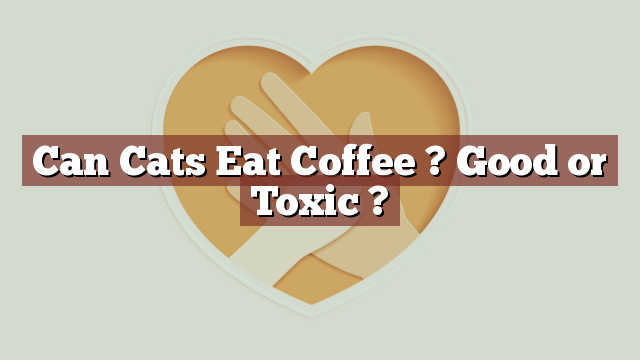Can Cats Eat Coffee? Good or Toxic?
It is important for pet owners to be aware of what foods are safe for their furry companions. While cats are known for their selective eating habits, there are certain foods that can pose a risk to their health. One such food that often raises questions is coffee. In this article, we will explore the nutritional value of coffee for cats, whether it is safe or toxic for them, potential risks and benefits, and what to do if your cat happens to consume coffee.
Nutritional Value of Coffee for Cats
Coffee is a popular beverage consumed by humans worldwide, mainly for its stimulating effects due to its caffeine content. However, when it comes to cats, the nutritional value of coffee is practically non-existent. Coffee is not a suitable food source for cats and does not provide any essential nutrients or vitamins necessary for their well-being. In fact, cats have different dietary requirements compared to humans, and their digestive systems may not be able to process certain substances found in coffee.
Is Coffee Safe or Toxic for Cats?
No, coffee is not safe for cats. It is important to note that caffeine, the key component in coffee, can be highly toxic to cats. Cats are more sensitive to caffeine than humans due to their inability to metabolize it efficiently. Even a small amount of caffeine can have severe effects on a cat’s health. Symptoms of caffeine poisoning in cats may include restlessness, rapid breathing, increased heart rate, vomiting, diarrhea, tremors, seizures, and in extreme cases, it could even be fatal.
Potential Risks and Benefits of Cats Consuming Coffee
The risks associated with cats consuming coffee far outweigh any potential benefits, as there are virtually no benefits to be gained. The caffeine in coffee can cause a range of health issues for cats, including cardiovascular problems, gastrointestinal disturbances, and nervous system disorders. It can also lead to dehydration, which can be especially dangerous for cats as they have a low thirst drive. It is therefore crucial to keep coffee and other caffeinated beverages out of reach from your feline companion.
What to Do if Your Cat Eats Coffee
If you suspect that your cat has ingested coffee or any caffeinated product, it is essential to seek immediate veterinary attention. Time is of the essence when dealing with caffeine poisoning in cats, as prompt medical intervention can significantly increase the chances of a positive outcome. Do not attempt to induce vomiting or administer any home remedies without professional guidance. Your veterinarian will be able to provide appropriate treatment and supportive care tailored to your cat’s specific needs.
Conclusion
In conclusion, coffee is not safe for cats to consume. The caffeine content in coffee can be highly toxic to cats and can lead to severe health complications. It is crucial for pet owners to be aware of the potential dangers of coffee and other caffeinated products and to keep them out of reach from their feline friends. If your cat happens to ingest coffee, it is imperative to seek immediate veterinary care. Remember, responsible pet ownership includes providing a safe and suitable diet for your cat to ensure their overall health and well-being.
Thank you for investing your time in exploring [page_title] on Can-Eat.org. Our goal is to provide readers like you with thorough and reliable information about various dietary topics. Each article, including [page_title], stems from diligent research and a passion for understanding the nuances of our food choices. We believe that knowledge is a vital step towards making informed and healthy decisions. However, while "[page_title]" sheds light on its specific topic, it's crucial to remember that everyone's body reacts differently to foods and dietary changes. What might be beneficial for one person could have different effects on another. Before you consider integrating suggestions or insights from "[page_title]" into your diet, it's always wise to consult with a nutritionist or healthcare professional. Their specialized knowledge ensures that you're making choices best suited to your individual health needs. As you navigate [page_title], be mindful of potential allergies, intolerances, or unique dietary requirements you may have. No singular article can capture the vast diversity of human health, and individualized guidance is invaluable. The content provided in [page_title] serves as a general guide. It is not, by any means, a substitute for personalized medical or nutritional advice. Your health should always be the top priority, and professional guidance is the best path forward. In your journey towards a balanced and nutritious lifestyle, we hope that [page_title] serves as a helpful stepping stone. Remember, informed decisions lead to healthier outcomes. Thank you for trusting Can-Eat.org. Continue exploring, learning, and prioritizing your health. Cheers to a well-informed and healthier future!

